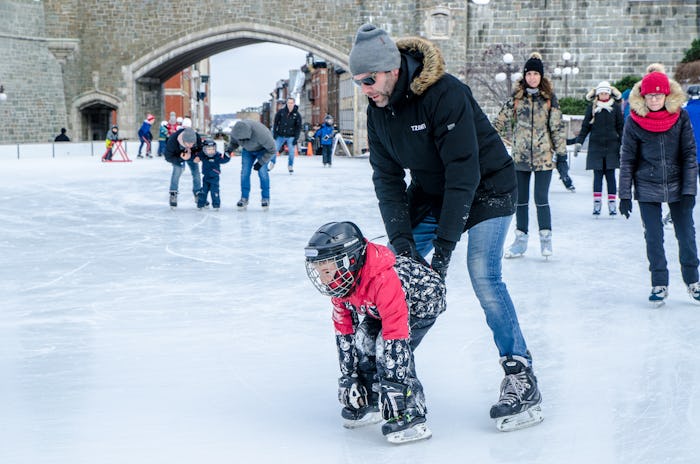Life

Here's What Pediatricians *Really* Think About Kids Ice Skating
Now that winter weather is officially upon us, many parents start fantasizing about fun-filled afternoons of gliding around an ice rink while holding the mittened hand of a beaming little one. But is attempting to slide over a sheet of ice with blades attached to one's feet actually all that safe for humans? Pediatricians' advice on ice skating and kids will make your holiday tradition fun and, hopefully, injury-free.
I reached out to pediatrician and parenting expert Dr. Jennifer Trachtenberg. Dr. Jen, as she is called, also serves as a SpokesDoctor for the American Academy of Pediatrics. For the most part, Dr. Jen gives ice skating the thumbs up: "It's a great social and recreational activity for kids. It's a great way for kids to get aerobic, heart-pumping exercise, improve coordination, balance, strength, and endurance."
All good so far. But of course, taking the proper safety precautions is crucial to the activity. "I always recommend kids wear helmets while skating to decrease the risk of concussion, fractures, and other head injuries," she says.
The idea of wearing a helmet for skating might sound kind of funny, and maybe even extreme. But it totally isn't. In a study by the American Academy of Pediatrics, they compared head injuries between children who were ice skating, skateboarding, or in-line skating. The results? "The proportion of head injuries among ice-skaters in this study was greater than that observed for participants in other types of skating, for which helmet use is recommended and often required."
Which makes total sense when you think about it. I mean I would never let my kid rollerblade without a helmet. So why on earth would I forgo a helmet when letting him attempt to run over ice wearing what are essentially knife shoes? (And if your kid is outraged by the idea of a helmet? Well, present him or her with one of these options from Nutcase, and they will likely change their tune.) Along with helmets, Dr. Jen says knee pads and wrist guards are also a good idea, as they can help prevent sprains and broken bones.
And of course, where you skate is super important. Dr. Michael Ronan is a pediatrician with ProHEALTH Care, and he advises caution in choosing a rink. "Only allow children to skate on approved surfaces, such as an indoor or outdoor ice rink, or a body of water that has been frozen for a sufficient amount of time and tested by the local police or parks department to ensure the ice is thick enough," he tells Romper.
If you aren't sure if a local sheet of ice is safe enough? "When skating outside, you want to check if there are signs posted about the safety of the ice," Ronan says. "Or you can call the local police or recreation department to find out if the ice is safe for skating."
So yeah, don't just go traipsing out to that pond by the side of the road, no matter how picturesque is might look for Instagram. (Note: Falling through ice does not make for a good 'gram.)
Ronan offers a few other basic safety tips as well: "We advise children to skate in the same direction as the crowd to avoid injuries from running into other skaters. Children should also avoid darting across the ice and crossing in front of people. Never skate alone — especially outside. Always have a buddy whenever you are skating. And don’t chew gum, eat, or drink while skating."
Got that? Don't try to jam down a chili dog when balanced on sharp blades.
Really though, I feel like ice skating with little kids sort of falls into the same camp as "indoor water parks" and "sculpture museums" — it always sounds a bit better than the actual experience. But hey, if you enjoy clinging to a railing in the freezing cold while Shawn Mendes blasts from the speakers and you silently pray your child doesn't fall face-first (or even better, fall face-first and take you with them), well then by all means, happy skating!
Experts:
Dr. Jennifer Trachtenberg, pediatrician and assistant clinical professor of pediatrics at The Icahn School of Medicine at Mount Sinai
Michael Ronan, M.D., F.A.A.P., pediatrician at ProHEALTH Care